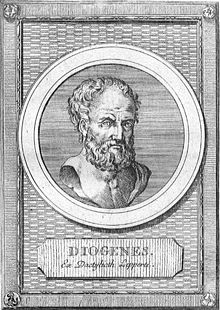- Diogenes of Babylon
-
For other uses, see Diogenes (disambiguation).
Diogenes of Babylon (also known as Diogenes of Seleucia; c. 230-c. 150/140 BCE[1]) was a Stoic philosopher. He was the head of the Stoic school in Athens, and he was one of three philosophers sent to Rome in 155 BC. He wrote many works, but none of his writings survive, except as quotations by later writers.
Life
Born in Seleucia on the Tigris in Babylonia, Diogenes was educated at Athens under the auspices of Chrysippus and succeeded Zeno of Tarsus as head (scholarch) of the Stoic school there in the 2nd century BC. Among his pupils were Panaetius and Antipater of Tarsus who succeeded him as scholarch. He seems to have closely followed the views of Chrysippus, especially on dialectic, in which he is said to have instructed Carneades.[2]
Together with Carneades and Critolaus, he was sent to Rome to appeal a fine of hundred talents imposed on Athens in 155 BC for the sack of Oropus. They delivered their epideictic speeches first in numerous private assemblies, then in the Senate. Diogenes pleased his audience chiefly by his sober and temperate mode of speaking.[3]
Cicero speaks of him as deceased by 150 BC,[4] and since Lucian claims that he died at the age of 80,[5] he must have been born around 230 BC. There is some evidence, however, that he may lived to around 140 BC.[6]
Works
Cicero calls Diogenes "a great and important Stoic."[7] In the works of the Epicurean philosopher Philodemus found in carbonized papyrus rolls recovered from the ruins of the Villa of the Papyri at Herculaneum, Diogenes is discussed more frequently than any philosopher besides Epicurus himself.[8]
He was the author of several works, of which, however, little more than the titles is known:
- Διαλεκτικὴ τέχνη - Dialectic Art.[9]
- On Divination.[10]
- On Athena.[11]
- Περὶ τοῦ τῆς ψυχῆς ἡγεμονικοῦ - On the Ruling Faculty of the Soul.[12]
- Περὶ φωνῆς - On Speaking.[13]
- Περὶ εὐγενείας - Οn Noble Βirth.[14]
- Περὶ νόμων - On Laws.[15]
In addition, it appears from Philodemus that he wrote extensive works On Music and On Rhetoric.[16] Some aspects of his views on these two subjects are recoverable from the critical remarks to be found in Philodemus' works on these two subjects.[16] There are several passages in Cicero from which we may infer that Diogenes wrote on other subjects also, such as duty, the highest good, and the like.[17]
Notes
- ^ Tiziano Dorandi, Chapter 2: Chronology, in Algra et al. (1999) The Cambridge History of Hellenistic Philosophy, pages 50-1. Cambridge.
- ^ Cicero, Academica, ii. 30; De Oratore, ii. 38
- ^ Aulus Gellius, Attic Nights, vii. 14; Cicero, Academica, ii. 45
- ^ Cicero De Senectute, 23
- ^ Lucian, Macrobii, 20
- ^ "[the traditional] chronology clashes with the dates for Mnesarchus and Dardanus and with the crucial events in the life of Antiochus of Ascalon. The date of Diogenes' death can reasonably be put forward at least a decade, to around 140." Tiziano Dorandi, Chapter 2: Chronology, in Algra et al. (1999) The Cambridge History of Hellenistic Philosophy, page 41. Cambridge.
- ^ Cicero, De Officiis, iii. 12
- ^ Obbink, D., "Craft, Cult, and Canon in the Books from Herculaneum," in Philodemus and the New Testament World (Leiden: Brill, 2004), p. 73-84.
- ^ Diogenes Laertius, vii. 51
- ^ Cicero, De Divinatione, i. 3, ii. 43
- ^ Cicero, De Natura Deorum, i. 15
- ^ Galen.
- ^ Diogenes Laertius, vii. 55
- ^ Athenaeus, iv. 168
- ^ In several books, the first of which is quoted in Athenaeus, xii.; cf. Cicero, De Legibus iii. 5, where "Dio" is a false reading for "Diogenes"
- ^ a b P. E. Easterling, Bernard Knox, (1989), The Cambridge History of Classical Literature: Part 3, pages 195-6. Cambridge University Press
- ^ Cicero, De Officiis, iii. 12, 13, 23; De Finibus, iii. 10, 15
This article incorporates text from the public domain Dictionary of Greek and Roman Biography and Mythology by William Smith (1870).
Preceded by
Zeno of TarsusLeader of the Stoic school
??? – 145 BCSucceeded by
Antipater of TarsusStoicism Philosophers Early StoaZeno of Citium · Persaeus · Aristo · Sphaerus · Herillus · Cleanthes · Chrysippus · Zeno of Tarsus · Crates of Mallus · Diogenes of Babylon · Apollodorus · Antipater of TarsusMiddle StoaPanaetius · Dardanus · Mnesarchus · Hecato · Posidonius · Diodotus · Geminus · Antipater of Tyre · Athenodoros CananitesLate StoaSeneca · Cornutus · Musonius Rufus · Euphrates · Cleomedes · Epictetus · Hierocles · Sextus · Junius Rusticus · Marcus AureliusPhilosophy Concepts Adiaphora · Apatheia · Ataraxia · Diairesis · Eudaimonia · Katalepsis · Logos · Kathekon · Physis · Pneuma · ProhairesisWorks Categories:- 2nd-century BC deaths
- 2nd-century BC philosophers
- Ambassadors to ancient Rome
- Hellenistic era philosophers from Asia
- Hellenistic era philosophers in Athens
- Stoic philosophers
Wikimedia Foundation. 2010.

